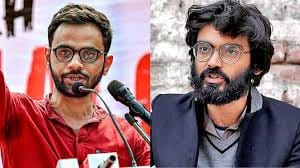New Delhi: In a three-day hearing regarding the 2020 Delhi riots, the Delhi High Court raised critical questions about the invocation of the Unlawful Activities (Prevention) Act (UAPA) against activists Umar Khalid, Sharjeel Imam, and Khalid Saifi. The activists, accused of conspiring in the riots, are seeking bail, highlighting delays in framing charges nearly five years after the incident, reports the Live Law.
A Division Bench comprising Justice Navin Chawla and Justice Shalinder Kaur asked the Delhi Police whether organising protests against the Citizenship (Amendment) Act (CAA) alone justified the use of UAPA charges. Stressing the purpose of the bail hearing, the Bench reminded the prosecution that establishing intent under UAPA is crucial, stating, “The Court is hearing bail pleas, not the final trial.”
The Bench directed the Special Public Prosecutor (SPP), Amit Prasad, to submit a concise note detailing evidence against the accused by January 21. Highlighting delays in the trial, the accused argued that protests against the CAA were peaceful expressions of dissent.
The court questioned the police’s reliance on WhatsApp chats and selective targeting of individuals from protest groups. It sought clarity on how such chats directly linked the accused to violence during the riots. Justice Chawla remarked, “People protested against a law, believing even a ‘chakka jam’ (road blockade) was valid. How does this justify UAPA?”
SPP Prasad presented over 2,000 WhatsApp messages, videos, and alleged conspiratorial communications. The Bench asked how these messages proved the accused’s involvement in instigating violence, emphasising that conspiracy must be substantiated with clear evidence.
When the prosecution referenced unnamed individuals in the chats, the Bench questioned why some participants were accused while others were not. “How can you rely on messages from individuals not named as accused?” the court asked.
The prosecution claimed Umar Khalid orchestrated the riots while strategically staying outside Delhi to avoid suspicion. Prasad alleged that Khalid planned the transportation of protestors and coordinated activities through WhatsApp groups like JACT and JCC. Referring to speeches and pamphlets, the prosecutor accused Khalid of creating fear among Muslims regarding issues like NRC-CAA, Triple Talaq, Babri Masjid, and Kashmir.
The Bench, however, urged the prosecution to focus on evidence directly connecting the accused to acts of violence, rather than speculations about their motives. “We need a bird’s-eye view of the evidence, not exhaustive commentary on every detail,” the court said.
The FIR (No. 59 of 2020) filed by the Delhi Police Special Cell accused 18 individuals, including activists and students, of orchestrating the riots. Charges under UAPA and the Indian Penal Code include conspiracy, rioting, and unlawful assembly. Prominent accused include Tahir Hussain, Safoora Zargar, Ishrat Jahan, and Meeran Haider, among others. While some have been granted bail, most remain in custody, with the main trial yet to commence.
Umar Khalid, arrested on September 13, 2020, has faced multiple bail rejections. His Special Leave Petition in the Supreme Court was withdrawn in February 2024, and his current bail plea remains under consideration by the Delhi High Court.
Human rights groups and activists have criticised prolonged delays in the trial and repeated bail rejections, labelling the case as a misuse of stringent laws to suppress dissent. With five years having passed since the riots, the demand for a fair and speedy trial has grown louder.
The High Court’s decision on the bail pleas is expected to have significant implications for the accused and the broader debate on the limits of dissent in a democracy.




